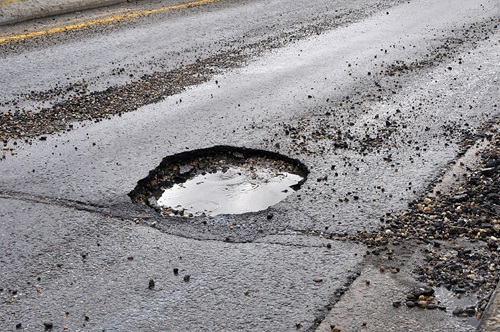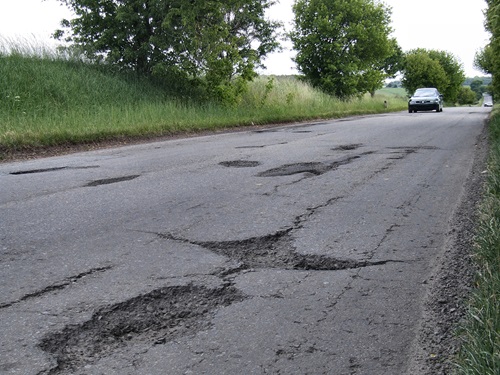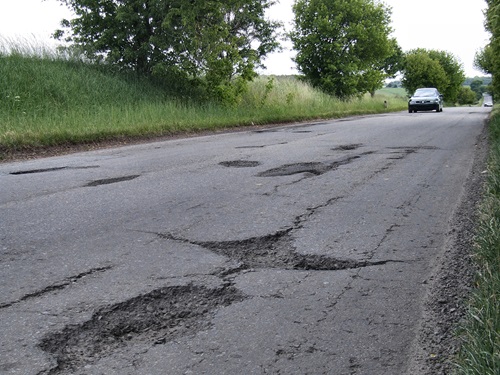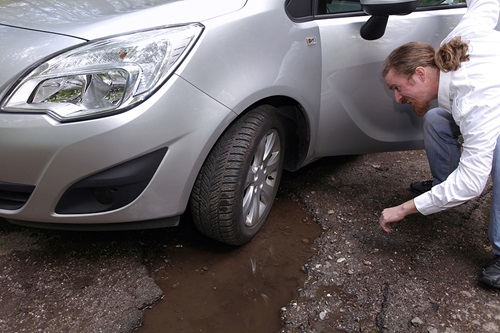Driving on Britain’s roads can, at times, seem like tackling a slalom. With increasing numbers of potholes and craters appearing, and road surfaces cracking and deteriorating daily, just negotiating their way along some routes is getting harder and harder for drivers. So what should you do if you destroy a wheel or tyre through no fault of your own, because of a pothole?
There can’t be a single driver in the UK who hasn’t heard the sickening crunch of their car’s wheel crashing through a pothole while driving on their local routes. Britain’s road network is still in need of serious investment as the cost to repair it fully has risen to more than £16 billion.

And as local MPs’ postbags continue to bulge with complaints from residents about the state of their towns’ roads and the damage they have suffered on them, local authorities have been given extra cash to patch up the crumbling tarmac and asphalt.
However, experts warn that it’s not enough and say that the entire system could fail unless significantly more money is spent on it.
The latest Annual Local Authority Road Maintenance (ALARM) survey has estimated that £16.3 billion is now needed to fix potholes and restore the country’s roads to an acceptable standard.
In the last 12 months around two million potholes have been filled in by local authorities, but report authors the Asphalt Industry Alliance says that still leaves 107,000 miles of highway needing to be ‘practically rebuilt within the next 15 years’.
Avoidance and claiming for pothole damage

So, what should you do to avoid hitting a hole in the road in the first place and how do you make a claim for pothole compensation if you do sustain damage from a road surface crater?
Watch it – spot the trouble ahead
- Always be aware of dangerous potholes on your regular journeys and try to remember their whereabouts. Find an alternative route if things start to get serious.
- Keep your distance from the car in front. Drivers often brake or swerve suddenly if they see a pothole late, so give everyone plenty of room.
- Stick to the speed limit, and slow down on smaller roads and residential streets where potholes may be widespread. The faster you hit a hole, the greater the likely damage.
- Never swerve to avoid a pothole; try to slow down or stop completely if you can safely. Drive over the hole slowly or manoeuvre around it if it’s safe to do so.

Report it – register a pothole
- Help your local authority and report any dangerous potholes that are causing problems in your area.
- Your local council website will guide you to the right procedure for reporting a pothole.
- Main roads are the responsibility of national agencies such as National Highways. Go to www.gov.uk/report-pothole or call them on 0300 123 5000, available 24 hours a day.
Claim for it – go for damages

- If you believe you have a valid claim for pothole damage, ensure you can give the exact location of damaged road section.
- Note down when you went through it, what direction you were travelling in, and how wide and deep you think it was.
- If it’s safe to stop, take photographs showing the size and severity of the hole.
- Obtain quotes for any repairs that might be required. Keep copies of everything, including receipts and invoices for work and components, if they form part of your claim.
- Write to the local authority, including all the details and requesting a settlement of your claim.
- You might get an initial rejection, with the local authority saying that it has a system of regular inspection and repair. But you can check what the council says it’s doing and take steps to make sure they are carrying out the work they claim to be undertaking.
- If you feel your case is strong enough, and the repair costs have been high enough to continue your fight, seek legal advice or take your case to the small claims court.
One less hazard
A MotorCheck history check won’t tell you how many potholes your potential next car has been through, but it will reveal other areas of risk, such as whether the vehicle has ever been damaged to the point of write-off, if it has ever been stolen, changed colour or not had the correct number of MOT tests carried out.
Armed with that peace of mind it’s one less pit of doom to avoid when buying your new used car.